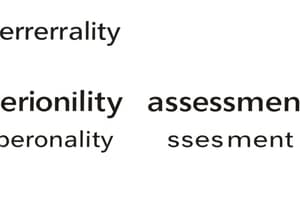Podcast
Questions and Answers
What is a personality trait?
What is a personality trait?
- A temporary predisposition
- A distinguishable way in which one individual varies from another (correct)
- An overall category of personality
- An evaluation of psychological states
What does self-concept differentiation refer to?
What does self-concept differentiation refer to?
- The similarity of self-concept across different contexts
- The degree to which a person has different self-concepts in different roles (correct)
- The number of distinct roles an individual identifies with
- The overall positivity of one's self-image
Which of the following describes socially desirable responding?
Which of the following describes socially desirable responding?
- Making uncommon or unusual responses
- Disagreeing with most statements
- Agreeing with all presented items
- Claiming extreme virtue in self-presentation (correct)
What is an example of a response style in personality assessments?
What is an example of a response style in personality assessments?
What is the purpose of a self-report in personality assessment?
What is the purpose of a self-report in personality assessment?
What does the Q-sort technique involve?
What does the Q-sort technique involve?
Which aspect is NOT a part of personality assessment?
Which aspect is NOT a part of personality assessment?
What is the aim of impression management within personality assessment?
What is the aim of impression management within personality assessment?
Flashcards
Personality
Personality
A unique combination of psychological traits that are relatively stable over time.
Personality Assessment
Personality Assessment
The process of measuring and evaluating an individual's personality traits and other psychological characteristics.
Personality Trait
Personality Trait
A distinguishable, relatively enduring characteristic that differentiates one person from another.
Personality Type
Personality Type
Signup and view all the flashcards
Personality State
Personality State
Signup and view all the flashcards
Self-Report
Self-Report
Signup and view all the flashcards
Self-Concept Measure
Self-Concept Measure
Signup and view all the flashcards
Self-Concept Differentiation
Self-Concept Differentiation
Signup and view all the flashcards
Study Notes
Personality
- Personality: A unique constellation of psychological traits, relatively stable over time
- Personality Assessment: Measures and evaluates psychological traits, states, values, interests, attitudes, worldview, acculturation, sense of humor, cognitive and behavioral styles
- Personality Traits: Distinguishable, relatively enduring ways individuals vary from each other
- Personality Type: Constellation of traits similar to a recognized personality category
- Personality States: Relatively temporary predispositions
Self-Concept and Self-Report
- Self-Report: Process where assessee provides information about themselves
- Self-Concept Measure: Instrument assessing how individuals view themselves regarding psychological variables
- Self-Concept Differentiation: Degree to which a person has different self-concepts in different roles
Response Styles
- Response Style: Tendency to respond to items/questions in a consistent manner, regardless of content
- Socially Desirable Responding: Presenting oneself favorably
- Acquiescence: Agreeing with presented items
- Nonacquiescence: Disagreeing with presented items
- Deviance: Giving unusual/uncommon responses
- Extreme Responding: Giving extreme ratings (very positive or very negative)
- Gambling/Cautious Responding: Guessing or not guessing
- Overly Positive Responding: Claiming extreme virtue
Impression Management
- Impression Management: Attempting to manipulate others' impressions through selective information exposure (potentially false)
Assessment Procedures
-
Structured Interview: Interviewers follow a guide with limited flexibility
-
Graphology/Handwriting Analysis: Analyzing handwriting for personality traits
-
Frame of Reference: Aspects of the focus (past, present, future), contextual factors (people, places, events)
-
Q-Sort Technique: Assessment sorting statements from most to least descriptive
Studying That Suits You
Use AI to generate personalized quizzes and flashcards to suit your learning preferences.




